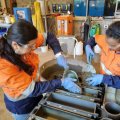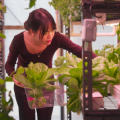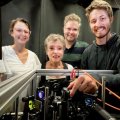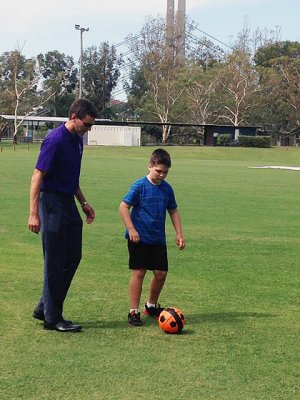
A robotic soccer ball is set to improve social ball game participation for people with visual impairment, thanks to a team of University of Queensland engineers and Vision Australia.
The Interactive-Ball (I-Ball), created by UQ Faculty of Engineering, Architecture, and Information Technology researchers, is a soccer ball that contains motion sensors, high-efficiency speakers and a small UQ-developed controller that can be programmed to suit the player.
It varies the sound based on motion and the environment, with the tone speeding or slowing depending on its movement.
Developed at the Robotics Design Laboratory by Dr Pauline Pounds, Dr Surya Singh and Dr Hanna Kurniawati, it improves on existing technology to increase accessibility to sports.
“Traditionally, balls designed for people who are blind or have low vision have been very simple – they contain bells, or are even just a ball wrapped in a plastic bag to create some noise,” Dr Singh said.
“We wanted to create a ball that was socially desirable, that would be the ‘cool ball’, and would make game play fun and inclusive.”
Dr Singh said the I-Ball was more advanced than existing electronic soccer balls designed for the blind or low vision community.
“There are some that just make a buzzing noise, similar to an alarm,” he said.
“Our ball can make a whole variety of sounds. We can play anything you want –from Shake it Off to Rachmaninoff.”
T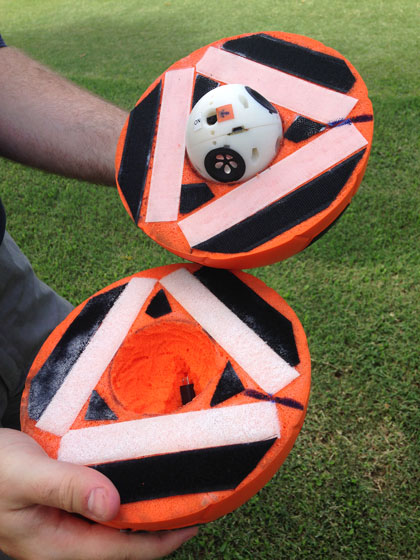 he team is working with Vision Australia, who have provided expertise on the social, physical and developmental aspects of vision, especially in regard to sport.
he team is working with Vision Australia, who have provided expertise on the social, physical and developmental aspects of vision, especially in regard to sport.
Vision Australia physiotherapist Louise Arvier said there had been positive feedback from trial games.
“Being included in physical activity, whether at school or as part of an adult sporting team, is important to a person’s health, confidence and social skills,” she said.
“It encourages movement and engagement with peers and builds self-esteem.
“The I-Ball is an exciting new technology that shows great potential in aiding people to participate on the field and court and to join in a wider range of sports.”
The work was supported by the Ian Potter Foundation and the Faculty of Engineering, Architecture, and Information Technology advancement office, and developed in consultation with Vision Australia and partner organisations.
For more information on the balll visit: http://robotics.itee.uq.edu.au/~iball/
Media: Senior Communications Officer Katie Rowney, Katie.rowney@uq.edu.au, 3365 3439; Vision Australia Communications Advisor Vanessa Sandhu, Vanessa.sandhu@visionaustralia.org, 0422 302 790.
.jpg)

